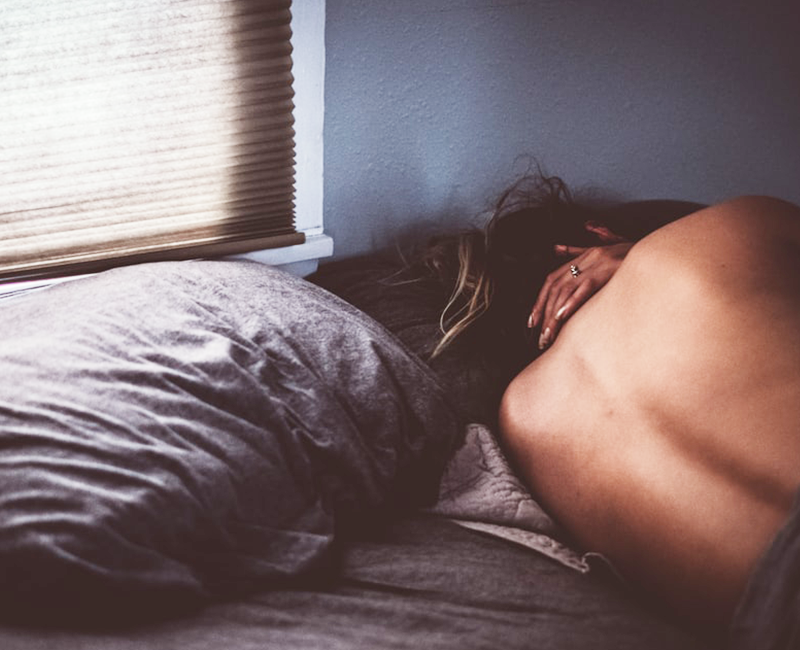I HAVE MENOPAUSAL INSOMNIA: WHICH TREATMENT IS BEST?

We all need to sleep. It’s just that simple, with doctors recommending that we get at seven hours of sleep a night. [1] Nevertheless, seven hours of restful and rejuvenating sleep is not a reality for many people, including women during the menopause.
According to the Sleep Foundation, up to 61% of menopausal women experience sleep-related issues as a result of the hormonal shifts that occur during the menopause, affecting many of the body’s regular routines and rhythms. [2] Unfortunately, the natural decline of oestrogen and progesterone in women’s bodies, means the more frequent interruptions to a good night’s sleep from night sweats to insomnia. You can find out more about the different ways menopause can affect sleep in our helpful guide.
To help put you mind (and body) at ease when nighttime comes around, here's our guide to treatments for menopausal insomnia.
Insomnia treatments
It is crucial to understand and acknowledge that insomnia can affect not just sleep but also lowers energy levels and mood; it can affect performance at work and the overall quality of life. [3] If insomnia is making it hard to function during the day, talk to your GP about treatments that could be right for you. However, if your insomnia lasts for shorter periods, days, and weeks, there are often simple lifestyle changes that will help ensure a good night’s rest.
Lifestyle changes
Most of the tips shared below target changes to daily routine and behaviour before bed:
- Create and stick to a sleep schedule throughout the week
- Raise your heartrate as regular activity helps to promote a good night’s sleep.
- Dress in lightweight, cooling clothing and sleepwear to improve sleep efficiency.
- Avoid or limit naps to under 30 minutes as they make it harder to fall asleep at night.
- Avoid or limit caffeine and alcohol
- Avoid large meals and beverages before bed
- Take a relaxing bath or shower
- Unwind with a book or by listening to soft music
- Use your bed only for sleeping, do not linger in bed if you are not sleepy.
There are also some holistic methods that can be used to cope with insomnia. Although effectiveness through medical research have not been proven, many people have experienced benefits by trying:
Meditation
A recent study published in JAMA Internal Medicine found that practitioners of mindful mediation did experience an improvement in sleep quality, mood, and overall energy levels. [4] Including any kind of relaxation exercise such as pilates into your daily routine, whether its before or early in the morning, can really help to put you into a positive, stress-free mindset — perfect for combating some of the anxiety that comes with the menopause.
Acupuncture
There has been a great deal of research into the effectiveness of acupuncture on insomnia, and although the initial research has shown that it is an effective treatment for insomnia, further trials with large groups are still required. [5]
Valerian root
This tall flowering grassland plant might sound unfamiliar, but it could help with insomnia. Commonly found as an herbal supplement, valerian may improve sleep quality according to an article in the American Journal of Medicine. [6]
As with any herbal remedy, however, it’s important to be careful when it comes to dosage amounts and possible side effects. Since previous studies have tested various dosage levels, it is not clear what dose will be most effective for a length of time. It is important to note that drug interactions are possible, so consult a doctor before adding valerian to your sleep routine. [7]
Is insomnia treated differently when it’s related to menopause?
Insomnia in women, although mostly attributed to the decline of oestrogen and progesterone, is not the only reason. Women are now busier than ever, supporting growing children and caring for aging parents, so it is unfair to attribute insomnia to just one health factor. As a result, varying treatment options exists to treat more than just hormonal decline but to address stress and a hectic lifestyle.
According to the Sleep Foundation, in the case of menopausal insomnia, nutritional products and medications such as calcium supplements, vitamin D, and bisphosphonates for the prevention or treatment of osteoporosis (thinning and weakening of the bones) could help alleviate symptoms of the menopause, improving your comfort and mood. [2]
Deciding what product to use, and for how long, are questions that should be discussed with a doctor. The answer will depend on personal and family medical history. Thus when looking for solutions and treatment options for menopausal insomnia, a multi-pronged approach is needed.
How to cope with insomnia symptoms in the meantime
If you are still struggling with insomnia, and the lifestyle and diet changes have not managed to help you fall asleep and wake up rested the refreshed, then consider any of the following solutions:
- Increase hydration levels
- Include a 30-minute nap
- See a therapist to work through emotional stressors
Although ongoing sleep struggles will affect mood and productivity it is essential to realise that options exist in the form of treatments and support. So there is no need to struggle on your own.
To discover even more advice on how you can stay feeling your best during the menopause, simply visit our Menopause Guide.
References
- Harvard. "Importance Of Sleep : Six Reasons Not To Scrimp On Sleep - Harvard Health". Harvard Health (2020). Available at: https://www.health.harvard.edu/press_releases/importance_of_sleep_and_health [accessed 6 March 2020]
- Sleep Foundation, Menopause and sleep (2020). Available at: https://www.sleepfoundation.org/articles/menopause-and-sleep [accessed 6 March 2020]
- Mayo Clinic, Insomnia (2020). Available at: https://www.mayoclinic.org/diseases-conditions/insomnia/symptoms-causes/syc-20355167 [accessed 6 March 2020]
- David S. Black, PhD, MPH1; Gillian A. O’Reilly, BS1; Richard Olmstead, ‘Mindfulness Meditation and Improvement in Sleep Quality and Daytime Impairment Among Older Adults With Sleep Disturbances’, in JAMA Intern Med. 2015;175(4):494-501. Available at: https://jamanetwork.com/journals/jamainternalmedicine/fullarticle/2110998 [accessed 6 March 2020]
- Huijuan Cao, M.D., Ph.D.(Cand.), Xingfang Pan, M.D., Hua Li, M.A.(Cand.), and Jianping Liu, M.D., Ph.D, ‘Acupuncture for Treatment of Insomnia: A Systematic Review of Randomized Controlled Trials’ in J Altern Complement Med. 2009 Nov; 15(11): 1171–1186. Available at: https://www.ncbi.nlm.nih.gov/pmc/articles/PMC3156618/ [accessed 6 March 2020]
- Stephen Bent, MDa, MD Stephen Bent, Amy Padula, MSb, Dan Moore, PhDc, Michael Patterson, MSa, Wolf Mehling, MD, ‘Valerian for Sleep: A Systematic Review and Meta-Analysis’ in American Journal of Medicine (2006). Available at: https://www.amjmed.com/article/S0002-9343(06)00275-0/fulltext [accessed 6 March 2020]
- Mayo Clinic, Valerian: A safe and effective herbal sleep aid? (2018). Available at: https://www.mayoclinic.org/diseases-conditions/insomnia/expert-answers/valerian/faq-20057875 [accessed 6 March 2020]
More Posts
-
MENOPAUSE SUPPLEMENTS
There are a range of herbs that have been used for thousands of years to relieve menopausal symptoms. You can now find many of these in supplement ...
Read More -
I HAVE MENOPAUSAL I...
We all need to sleep. It’s just that simple, with doctors recommending that we get at seven hours of sleep a night. [1] Nevertheless, seven hours ...
Read More -
CAN KEGAL EXERCISES...
Kegel exercises — they’re a polarising topic. Half of us might be thinking confidently, “I’ve been doing them for years”, while the others may well...
Read More






